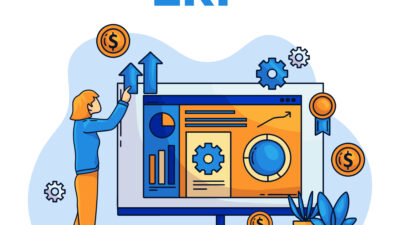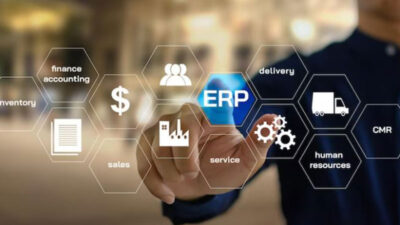In today’s fast-paced business environment, staying competitive requires more than just hard work—it requires smart work. For businesses in the USA, ERP (Enterprise Resource Planning) solutions have become a game-changer, offering a unified platform to manage and streamline operations across departments. From finance and HR to supply chain and customer relations, ERP systems are transforming how businesses operate.
In this blog, we’ll explore what ERP solutions are, why they’re essential for businesses in the USA, and how they can help you achieve operational excellence. Whether you’re a small business or a large enterprise, this guide will show you how ERP solutions can take your business to the next level.
What is an ERP Solution?
An ERP solution is a software platform that integrates various business processes into a single system. It allows companies to manage their operations more efficiently by providing real-time data and automating routine tasks. Key modules of an ERP system typically include:
- Finance and Accounting: Manage budgets, track expenses, and generate financial reports.
- Human Resources: Handle payroll, recruitment, and employee performance.
- Supply Chain Management: Optimize inventory, procurement, and logistics.
- Customer Relationship Management (CRM): Track customer interactions, sales, and marketing campaigns.
- Manufacturing: Oversee production planning, quality control, and maintenance.
Why ERP Solutions Are Essential for Businesses in the USA
The USA is home to some of the most competitive markets in the world. Here’s why ERP solutions are a must-have for businesses operating in this environment:
1. Improved Efficiency
- ERP systems automate repetitive tasks, reducing manual errors and freeing up employees to focus on strategic activities.
2. Real-Time Data Access
- With an ERP system, you can access real-time data from across your organization, enabling faster and more informed decision-making.
3. Cost Savings
- By streamlining operations and reducing inefficiencies, ERP solutions help businesses save money in the long run.
4. Scalability
- ERP systems are designed to grow with your business, making them ideal for companies planning to expand.
5. Regulatory Compliance
- ERP solutions help businesses stay compliant with industry regulations and standards, reducing the risk of penalties.
6. Enhanced Customer Experience
- By integrating CRM modules, ERP systems enable businesses to provide better customer service and build stronger relationships.
Top ERP Solutions for Businesses in the USA
Here are some of the most popular ERP solutions used by businesses in the USA:
- SAP S/4HANA
- Known for its robust features and scalability, SAP S/4HANA is a top choice for large enterprises.
- Oracle ERP Cloud
- Oracle’s ERP Cloud offers a comprehensive suite of applications for finance, procurement, and project management.
- Microsoft Dynamics 365
- A flexible and user-friendly solution, Microsoft Dynamics 365 is ideal for mid-sized businesses.
- NetSuite ERP
- NetSuite is a cloud-based ERP solution that offers a wide range of modules for businesses of all sizes.
- Infor CloudSuite
- Infor’s industry-specific ERP solutions are designed to meet the unique needs of various sectors, including manufacturing, healthcare, and retail.
Key Benefits of ERP Solutions
- Streamlined Operations
- ERP systems integrate all business processes into a single platform, eliminating silos and improving collaboration.
- Better Decision-Making
- With real-time data and advanced analytics, ERP solutions empower businesses to make data-driven decisions.
- Increased Productivity
- Automation of routine tasks reduces manual effort and increases overall productivity.
- Improved Customer Satisfaction
- By providing a 360-degree view of customer interactions, ERP systems help businesses deliver personalized experiences.
- Enhanced Security
- ERP solutions offer robust security features to protect sensitive business data.
Industries That Benefit from ERP Solutions
ERP solutions are versatile and can be used across various industries. Here are a few examples:
- Manufacturing: Optimize production processes, manage inventory, and ensure quality control.
- Retail: Streamline supply chain operations, manage customer relationships, and track sales performance.
- Healthcare: Manage patient records, streamline billing processes, and ensure regulatory compliance.
- Finance: Automate financial reporting, manage budgets, and ensure compliance with industry regulations.
- Education: Streamline administrative processes, manage student records, and track academic performance.
How to Choose the Right ERP Solution for Your Business
Choosing the right ERP solution is crucial for your business’s success. Here are some tips to help you make the right choice:
- Assess Your Needs
- Identify the key challenges your business faces and determine which ERP modules can address them.
- Consider Scalability
- Choose an ERP solution that can grow with your business and adapt to changing needs.
- Evaluate Integration Capabilities
- Ensure the ERP system can integrate with your existing software and tools.
- Check Vendor Reputation
- Research the vendor’s track record, read customer reviews, and ask for case studies.
- Consider Total Cost of Ownership
- Look beyond the initial cost and consider long-term expenses, including maintenance and upgrades.
- Request a Demo
- Before making a decision, request a demo to see the ERP system in action and evaluate its user-friendliness.
FAQs About ERP Solutions
Q1: What is the cost of implementing an ERP solution?
- The cost varies depending on the size of your business, the complexity of the system, and the vendor. It’s important to consider both upfront and ongoing costs.
Q2: How long does it take to implement an ERP system?
- Implementation time can range from a few months to over a year, depending on the scope of the project and the complexity of the system.
Q3: Can ERP solutions be customized?
- Yes, most ERP solutions offer customization options to meet the unique needs of your business.
Q4: What are the risks of implementing an ERP system?
- Potential risks include high costs, implementation delays, and resistance from employees. Proper planning and change management can mitigate these risks.
Q5: Is cloud-based ERP better than on-premise ERP?
- Cloud-based ERP offers greater flexibility, scalability, and cost savings, while on-premise ERP provides more control over data and security. The choice depends on your business needs.
Conclusion: Why ERP Solutions Are the Future
ERP solutions are no longer a luxury—they’re a necessity for businesses looking to stay competitive in today’s fast-paced market. By streamlining operations, improving efficiency, and providing real-time insights, ERP systems empower businesses to achieve their goals and drive growth.
Whether you’re a small business or a large enterprise, investing in the right ERP solution can transform your operations and set you up for long-term success. So, what are you waiting for? Explore the best ERP solutions for your business today and take the first step toward operational excellence.




